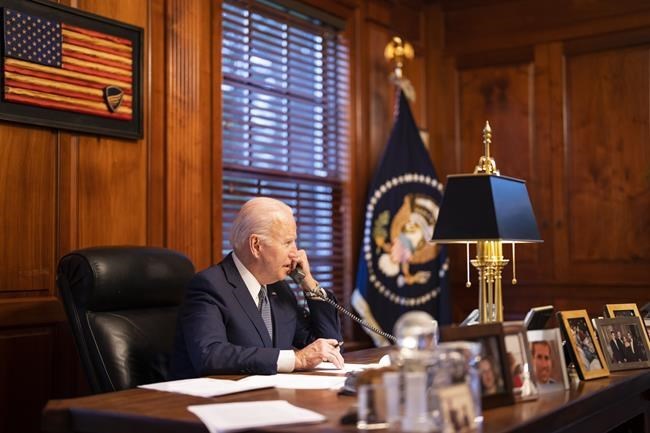WASHINGTON (AP) ŌĆö The United States and Germany said Wednesday that RussiaŌĆÖs military buildup near UkraineŌĆÖs border poses an ŌĆ£immediate and urgent challengeŌĆØ to European security and that any intervention will draw severe consequences.
Secretary of State Antony Blinken and German Foreign Minister Annalena Baerbock presented a unified front on Russia after a meeting in Washington. The severity of any response to a Russian invasion of Ukraine hinges largely on Germany, EuropeŌĆÖs biggest economy and a diplomatic heavyweight within the 27-nation European Union.
ŌĆ£Both Germany and the United States see RussiaŌĆÖs actions toward Ukraine as an immediate and urgent challenge to peace and stability in Europe," Blinken said.
ŌĆ£We condemn RussiaŌĆÖs military buildup on UkraineŌĆÖs borders, as well as RussiaŌĆÖs increasingly harsh rhetoric as it continues to push the false narrative that Ukraine seeks to provoke (Russia),ŌĆØ he said. "ThatŌĆÖs a little bit like the fox saying it had no choice but to attack the henhouse because somehow the hens presented a threat.ŌĆØ
Baerbock agreed. ŌĆ£We jointly reiterated that Russian actions and activities come with a clear price tag, and a renewed violation of Ukrainian sovereignty by Russia would have severe consequences,ŌĆØ she said.
The Blinken-Baerbock meeting followed a telephone call last week between President Joe Biden and Russian President Vladimir Putin, a conversation Sunday between Biden and Ukrainian President Volodymyr Zelenskyy, and a group discussion Tuesday among BidenŌĆÖs national security adviser Jake Sullivan and his counterparts from the five Nordic nations.
It also preceded a flurry of meetings involving NATO foreign ministers, senior U.S. and Russian officials, the NATO-Russia Council and the Organization for Security and Cooperation in Europe set for next week.
ŌĆ£The real question is whether Russia is serious about diplomacy, serious about de-escalation," Blinken said. "LetŌĆÖs see where this goes over the next weeks.ŌĆØ
Western officials have hinted at any number of economically crippling sanctions that could be imposed should Russia act. Those include near total cutoff from the international financial system and steps toward greater NATO integration with non-allied European nations.
As the Biden administration moves to build international consensus around a set of possible punitive measures, Germany is clearly the linchpin. Securing its support will be key to both messaging and implementation of whatever is decided.
Baerbock is the top diplomat in the first German government in 16 years not headed by Angela Merkel. She has struck a tougher tone on Russia than her predecessor. But Germany has adopted a less confrontational stance toward Russia compared with many other European nations.
GermanyŌĆÖs business ties with Russia could provide leverage, but they could also prove a hindrance for forging a united front toward Moscow. Despite strong criticism from the U.S., the center-left government of new Chancellor Olaf Scholz hasnŌĆÖt shown itself willing to block the start of natural gas deliveries through a newly built pipeline linking Russia and Germany ŌĆö a move that would hurt both countries.
Under Merkel, Germany persuaded the Biden administration last year not to impose sanctions on the company building the Nord Stream 2 pipeline, which many believe will leave Europe beholden to Russia for energy and Ukraine more vulnerable.
Blinken noted that the pipeline, while completed, has yet to go into operation and said gas flows through it would be unlikely if Russia invades Ukraine.
ŌĆ£If Russia renews its aggression toward Ukraine, it would certainly be difficult to see gas flowing through it in the future,ŌĆØ he said. This actually gives the EU leverage over Russia, he said, rather than the other way around.
Baerbock did not specifically address the question of whether the pipeline would be operationalized in the event of a Russian intervention.
Nord Stream 2 is a topic of major concern in Washington, and Congress is expected to take up two bills related to it and other Russia sanctions next week, just as the meetings in Europe are happening. A GOP bill would automatically impose Nord Stream sanctions, while a Democratic version would impose a wider range of penalties on Russia should it invade Ukraine.
Both Democratic and Republican lawmakers in Washington have blamed Nord Stream 2 for increasing RussiaŌĆÖs leverage over Germany and limiting what Berlin would be willing to do in response to a new invasion. Germany, like much of the European Union, is heavily reliant on Russian natural gas.
Matthew Lee And Frank Jordans, The Associated Press


